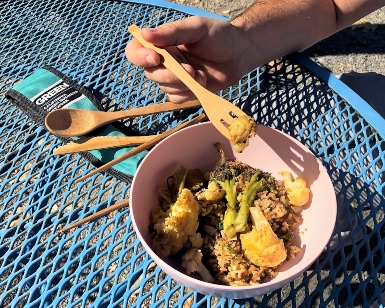San Rafael, CA – Marin County, long considered a leader in sustainability practices and environmental causes, is putting the final touches on a draft ordinance that would ban plastic utensils and other takeout foodware that is not reusable or compostable. If approved, ordinance enforcement would be gradual as businesses adapt to the changes.
 The County of Marin is encouraging the use of reusable utensils and other foodware to reduce trash in landfills, especially those made of plastic that won't decompose.
The County of Marin is encouraging the use of reusable utensils and other foodware to reduce trash in landfills, especially those made of plastic that won't decompose.The Marin County Board of Supervisors plans to introduce the ordinance April 19 and consider placing it on the May 10 agenda for adoption. Details can be found on www.marincounty.org/foodware. Should it receive Board support, the ordinance would affect food vendors only in unincorporated parts of the county; it’s up to each town and city to establish its own policy. If the ordinance is adopted, County staff plans to work with local municipalities to seek countywide consistency for all food Marin facilities.
Staff from the Marin County Community Development Agency (CDA) is aware of the recent challenges faced by food-related businesses because of COVID-19 and delayed the ordinance’s introduction to be respectful of economic realities. Additionally, enforcement of the ordinance would begin 18 months after its adoption. The gradual introduction would allow businesses time to switch sourcing of supplies and deplete existing stock. However, the proposed ordinance would take a proactive approach in educating all retail food facility owners regularly of the requirements of the proposed ordinance and taking enforcement action only as necessary.
CDA staff has worked several years on the ordinance, namely those from the Sustainability Division and the Environmental Health Division.
The draft ordinance was first introduced in February 2020, and feedback from both the public and the Supervisors was incorporated in the latest version. The movement to ban plastic foodware is partly fueled by reaction to a public online survey in 2019 that showed 90% support for requiring food vendors to use foodware that are reusable, recyclable, or compostable.
The ordinance would require the use of reusable and compostable foodware materials such as plates, bowls, cups, utensils, and trays at restaurants, grocery stores, delis, bakeries, carry-out vendors, minimarts, farmers markets, food trucks, and other food outlets. Should foodware or foodware accessories made of compliant compostable natural fiber not be commercially available, as determined by the EHS Director or their designee, the County may approve a temporary exemption of specific nonreusable foodware or foodware accessories items until they are made commercially available.
Under current rules, only a limited amount of synthetic material can be composted in Marin; the rest goes into landfills. The county’s largest waste product processor, the WM EarthCare Compost Facility at the Redwood Landfill & Recycling Center north of Novato, does not accept many commonly labeled compostable materials such as bioplastics. Also, franchised refuse companies around Marin accept slightly different materials for recycling, composting, or hazardous waste disposal and have different strategies for outreach to the community.
Plastic waste is a large portion of the debris polluting rivers, streams, and the ocean. Reduction of plastics at the source by encouraging re-use and recyclable or compostable materials would reduce debris and improve environmental conditions.
In 2009, the County banned polystyrene foam in food packaging by restaurants, retail food vendors, and County facilities within the unincorporated areas of Marin. Fairfax, San Rafael, Novato, Mill Valley, and Sausalito subsequently adopted their own bans.